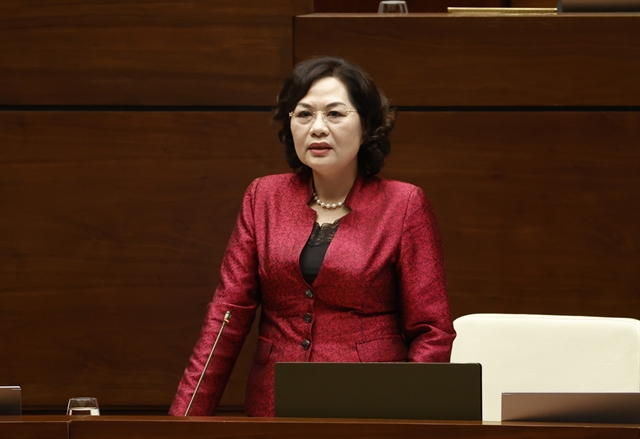 Economy
Economy

Deputy Prime Minister Lê Minh Khái clarified a number of issues raised by National Assembly (NA) deputies regarding banking activities as part of the ongoing NA third meeting's question-and-answer session on June 9.

|
| SVB Governor Nguyễn Thị Hồng was grilled by deputies at the ongoing NA's morning session on June 9 relating to banking, gold and money related issues. — VNA/VNS Photo |
HÀ NỘI — Deputy Prime Minister Lê Minh Khái clarified a number of issues raised by National Assembly (NA) deputies regarding banking activities as part of the ongoing NA third meeting's question-and-answer session on June 9.
The Deputy PM cited the State Bank of Vietnam (SVB) Governor’s affirmation as saying that the increasing inflation does not come from recent monetary policies, especially in the first five months of this year, but from the rise in prices of commodities.
He said that the Government will continue to stick to NA resolutions and keep a close watch on the domestic situation to manage monetary tools and policies in an active, flexible and synchronous manner, aiming to curb inflation, stabilise the monetary and foreign exchange markets, while drastically implementing monetary policy solutions to support the socio-economic recovery and development programme.
The Government will also make sure that interest rate management will match macro balances as well as inflation and monetary policy targets, continue to remove difficulties for and support COVID-19-hit businesses and ensure safety for banking activities, he stated.
Regarding credit room, an issue that drew NA deputies’ attention, Deputy PM asked the SBV to consider the regulations, conditions and criteria for granting more credit quota to commercial banks.
Over the restructuring of credit institutions, he said that the legal framework in the field has been completed, resulting in positive changes in their scale, financial capacity, credit quality and operational efficiency, contributing to mobilising resources for socio-economic development, especially for prioritised sectors.
He noted that the PM has issued Decision No. 689/QĐ-TTg approving a project to restructure credit institutions in association with the settlement of bad debts in the 2021-25 period, which provides many measures to enhance the efficiency and transparency of the banking sector and ensure safety for the banking system. The decision also sets targets for the application of Basel II standards for banks, aiming to make Việt Nam one of the four leading countries in ASEAN in the field in 2025, he added.
Mentioning measures to deal with inefficient banks, he said that so far, the Government has received directions from the Politburo for a report on the plan to settle four weak commercial banks. Accordingly, the Government will direct the SBV to map out specific plans to seek approval in the time to come, he added.
Over the control of credit in securities, bond and real estate sectors, Deputy PM Khái said that the Government and the PM have requested the SBV to make sure that credit provision fully and promptly meet the capital demand for business activities, especially in prioritised sectors while tightening control of credit flows into risky areas.
In the early morning session, Governor of the central bank Nguyễn Thị Hồng was grilled again on issues regarding gold prices and banking-related issues.
Questioning the monopoly on gold bar production, Deputy Phạm Văn Hòa of Đồng Tháp Province said that the Decree 24 on the management of the gold business was issued by the Government 10 years ago, when the price of SJC gold was only about VNĐ30-35 million per tael. Now the gold price has reached VNĐ70 million per tael. Hòa questioned why the central bank has not amended this Decree.
Responding to the question, Governor Hồng said under Decree 24, the SBV regulates the production of gold bullion and the importation and exportation of raw gold material. The bank is the only institution authorised to accept gold savings from organisations and individuals and trading the precious material on gold exchanges.
That was the reason why the central bank choose Saigon Jewelry Holding Company (SJC) to produce gold bullions. This means such activities conducted by any other entities would be deemed illegal.
NA Deputy Nguyễn Phương Thủy of the Hà Nội delegation said that whether the monopoly of SJC gold brand was the cause of the high price of gold or not.
Hồng told the NA that SJC has been a favourite gold brand of the people before the Decree 24 was issued.
She further said that in the past, the gold market showed many shortcomings, and even caused instability to the macro-economy. Since the Decree 24 on gold business management was issued, State management policies have been implemented effectively and, in many years, the foreign exchange market has been stable, helping Việt Nam to get higher ranking in international assessments.
She noted that in the past, SJC gold was the brand that accounted for over 90 per cent of the domestic market. After careful assessments of costs and benefits, SBV decided to hire SJC to produce gold bullion under the strict management of SBV, Hồng said, noting that SJC’s gold price was high but buyers could sell them at high prices while other brands were bought and sold at low prices. Hồng added that the SBV would collect opinions to choose more producers to make gold bullions with a trademark of the SBV.
According to Hồng, as of 2014 onwards, SBV has not imported gold materials to produce gold bars anymore. The move has resulted in a decrease in the domestic gold supply. Meanwhile, a part of gold has been converted to jewellery production. — VNS




.jpg)